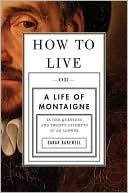More on this book
Community
Kindle Notes & Highlights
In dying, he now realized, you do not encounter death at all, for you are gone before it gets there.
If you don’t know how to die, don’t worry; Nature will tell you what to do on the spot, fully and adequately. She will do this job perfectly for you; don’t bother your head about it.
A typical page of the Essays is a sequence of meanders, bends, and divergences. You have to let yourself be carried along, hoping not to capsize each time a change of direction throws you off balance.
The trick is to maintain a kind of naive amazement at each instant of experience—but, as Montaigne learned, one of the best techniques for doing this is to write about everything. Simply describing an object on your table, or the view from your window, opens your eyes to how marvelous such ordinary things are.
If others examined themselves attentively, as I do, they would find themselves, as I do, full of inanity and nonsense. Get rid of it I cannot without getting rid of myself. We are all steeped in it, one as much as another; but those who are aware of it are a little better off—though I don’t know. That final coda—“though I don’t know”—is pure Montaigne. One must imagine it appended, in spirit, to almost everything he ever wrote. His whole philosophy is captured in this paragraph. Yes, he says, we are foolish, but we cannot be any other way so we may as well relax and live with it.
This was what Montaigne looked for in a book, just as people later looked for it in him: the feeling of meeting a real person across the centuries.
One cannot imagine him kissing volumes like holy relics, as Erasmus or the poet Petrarch reportedly used to, or putting on his best clothes before reading them, like Machiavelli, who wrote: “I strip off my muddy, sweaty, workaday clothes, and put on the robes of court and palace, and in this graver dress I enter the courts of the ancients and am welcomed by them.” Montaigne would have found this ridiculous. He preferred to converse with the ancients in a tone of camaraderie, sometimes even teasing them, as when he twits Cicero for his pomposity or suggests that Virgil could have made more of
...more
The idea that the human mind could find things out for itself was the very thing Skeptics were likely to be most skeptical about.
He called Montaigne “this freest and mightiest of souls,” and added: “That such a man wrote has truly augmented the joy of living on this earth.” Montaigne apparently managed the trick of living as Nietzsche longed to do: without petty resentments or regrets, embracing everything that happened without the desire to change it.
For a husband to behave as an impassioned lover to his wife was thought morally wrong, because it might turn her into a nymphomaniac. Minimal, joyless intercourse was the proper sort for marriage. In an essay almost entirely about sex, Montaigne cites the wisdom of Aristotle: “A man … should touch his wife prudently and soberly, lest if he caresses her too lasciviously the pleasure should transport her outside the bounds of reason.” The physicians warned, too, that excessive pleasure could make sperm curdle inside the woman’s body, rendering her unable to conceive. It was better for the
...more
Montaigne loved open debate. “No propositions astonish me, no belief offends me, whatever contrast it offers with my own.” He liked being contradicted, as it opened up more interesting conversations and helped him to think—something he preferred to do through interaction rather than staring into the fire like Descartes.
Once the ice had been broken by Florio and Bacon, innumerable English books appeared with the word Essays in their title. Some were overtly inspired by Florio’s Montaigne, others by Bacon, but in almost every case it was from Montaigne that they took their style of writing and thinking. Very few English essays after the early seventeenth century were philosophically rigorous stabs of thought on important topics; almost all were delightful rambles about nothing in particular.
The Essays always seemed to Gournay the perfect intelligence test. Having asked people what they thought of the book, she deduced what she should think of them. Diderot would make almost the same observation of Montaigne in a later century: “His book is the touchstone of a sound mind. If a man dislikes it, you may be sure that he has some defect of the heart or understanding.”


